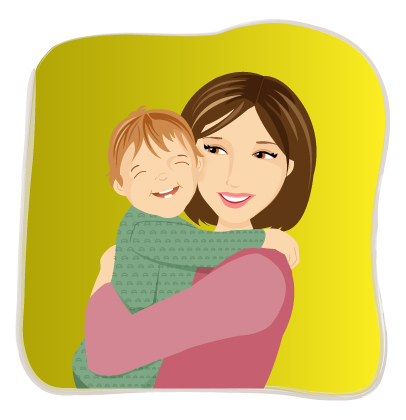The Benefits of Early Potty Training
(Initiating rather than Waiting)
Let’s first define what this article means by early potty training. We are not talking here about infant potty training (this subject is discussed on a different page).
This article, is about creating some potty training incentive for parents; its purpose is simply to encourage parents who don’t want to wait until their child reaches readiness -- to take initiative and start earlier; lead potty training.
Suppose my child is older than 2 years of age, and has not "reached readiness" by the conventional signs: Do I wait?
What if he's approaching 3 years of age? Do I wait then?
There are some good reasons why earlier training could benefit your child. I invite you to read further and see what you think.
In the context of this discussion, early potty training doesn’t refer to a specific age; it simply serves the attitude of initiating and leading potty training -- as oppose to waiting for readiness (and practically leaving this decision for the child).
The knowledge brought in this article is based partially on my past sessions with a professional consultant for child development specializing in toilet training, who had helped me a lot with my first child.
Additional sources used:
- Barton D. Schmitt, MD; Toilet training: Getting it right the first time; Contemporary Pediatrics, Mar 2004.
- Scott Tennant; Toilet training more beneficial when started early; Urology Times, Apr 2010
-
Toddlers and infants have the maturity to learn potty training earlier than most parents actually begin to potty train.
Mostly, when we hear about (or experience) potty training daytime accidents that continue for weeks or months -- it more likely has to do with setting boundaries or setting expectations for the child, rather than being related to physiological or developmental issues (i.e. "lack of readiness" on the child's part).
[--- Sidebar --- The trend of potty training after 2.5-3 years of age and older, has become more popular in the western world over the last decades.
Reasons for that? -- mainly:
(1) The association of early potty training with emotional trauma; an incorrect perception, possibly influenced by outdated psychological attitudes that had shaped in a time when there was very little empathy to children, and hygiene education went together with force.
(2) The child-oriented approach to toilet training (introduced by Brazelton in 1962), recommending parents to gradually expose children to the concept of potty training, and let the motivation and initiative come from the child.
(3) The availability and the convenience of disposable diapers.
--- end of sidebar ---]
-
Toddlers do not face any psychological risk by being potty trained early. On the contrary: Many problems can come from delaying potty training until the age known as the “terrible two”, when toddlers become much more opinionated and aware:
-
At this age they are less likely to get enthusiastic about changing their toilet habits (getting out of the diapers that is), and more likely to resist and challenge mom’s and dad’s authority.
-
The older they are, they have more likely gotten used to ignoring bludder and bowel signals, because "going in the diaper" doesn't require much of awareness.
-
They have grown accustomed to the comfortable, lazy habit of defecating in the diaper, which doesn't require them to stop playing or watching TV. (On a more personal note, this might become a major hurdle as I've seen with my first boy..)
-
Due to the force of habit, and typical behavioral issues associated with the "terrible twos" phase (which as we know doesn't really stop at two), potty training at an older-age can many times prolong the process and introduce difficulties that parents will find very hard to cope with.
-
Succeeding in potty training contributes to the young toddler above and beyond the specific achievement of being potty trained:
-
It develops their ability to postpone gratification
-
Develops self-control and self-adjustment skills
-
Learning to use the toilet can enhance children's sense of independence and capability, and helps increasing their confidence and self-esteem.
-
Teaching toddlers to use the toilet is more respectful towards them; if they have reached the age when we begin teaching them table manners, why would this be any less important? (something to consider)

Aside from supporting and encouraging the toddler’s development, early potty training has the following benefits:
-
Saves money: Parents of a two-year old may find themselves spending around 100$ per month for diapers. And then there are also the cleaning-wipes, and diaper creams.
-
Toilet training is better for childrens' health (by avoiding diapers rash for example), and it is a great opportunity to start educating them on the subject of personal hygiene.
-
It provides more flexibility in choosing Daycare, and one less thing to worry about in choosing Daycare (like worrying how frequently do children get changed at this daycare)
-
Ecological incentive: It takes more than 500 years for the common “Disposable Diaper” to actually get consumed. You’d be doing a huge favor to the earth by potty training early.
We hope you've found this page helpful, and that it has given you some encouragement to go for an early potty training, in case you were considering it.
That means you realize it’s in your hands; that you don't necessarily need to sit and wait months for your child to become ready -- you are free to take the initiative, if it suits you.
Return from Benefits of Early Potty Training to
When to Start Potty Training
Return from Benefits of Early Potty Training to
Potty Training Tools Home page
